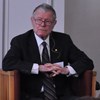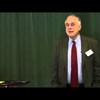him

Interview with Daniel Wikler on what happened after a seminar on ethics and e-cigs
Director and Professor of Practical Philosophy Gustaf Arrhenius met up with Daniel at a conference in Kigali and took the opportunity to ask him what happened after his talk on ethics and e-cigs at th

Interview with Thomas Schelling
On the 7th of June, 2013 professor and Nobel Prize Winner Thomas Schelling came to visit Stockholm, Sweden and the Institute for Futures Studies in order inaugurate an international research conferenc
Reactions on a seminar on ethics and e-cigarettes
In 2016 dozens of prominent researchers from around the world came to our institute to work on the ambitious research report "Rethinking society for the 21st century" by the International Panel on Soci. One of the many interesting researchers we had the pleasure of hosting was Daniel Wikler, Professor of Ethics and Population Health.
Interview with Erik Olin Wright
Earlier this spring, Erik Olin Wright came to Stockholm to talk at our research seminar. He spoke about pathways to a cooperative market economy. The day before, sociologist Stefan Svallfors took the

Ethics and E-cigs. An Analysis and A Proposal
Daniel Wikler, Professor of Ethics and Population Health, speaks at a research seminar at the Institute for Futures Studies in Stockholm, suggesting a public health initiative to decrease the amount o
Do good. And do it better
Do you ever donate money to a charitable cause? If you do, how do you choose what cause to favour? The Scottish philosopher William MacAskill says that we are generally quite bad at regarding donation
A monster in the making. On the euro crisis and democracy
What started off as a political project aimed at strengthening democracies has become an economic project in crisis that undermines democracy. That is how economist Matthias Matthijs describes the Eur
Anders Sandberg: The Survival Curve of Our Species: Handling Global Catastrophic and Existential Risks
Anders Sandberg, Future of Humanity Institute, Oxford University ABSTRACTHow likely is humanity to be severely damaged by a global disaster, or go extinct? How bad would it be? This talk will review wo
Richard Bradley: Confidence and probability. Climate change assessments and policy decision making
Richard Bradley, professor at the Department of Philosophy, Logic and Scientific Method, London School of Economics and Political Science ABSTRACTThe periodic assessment reports of the Intergovernment

Sovereignty and sustainability - friends or foes? Interview with Steven Vanderheiden
To limit the global warming to a maximum of two degrees above pre-industrial levels, much of the coal and oil reserves on earth must stay in the ground. This requires international agreements to limit








